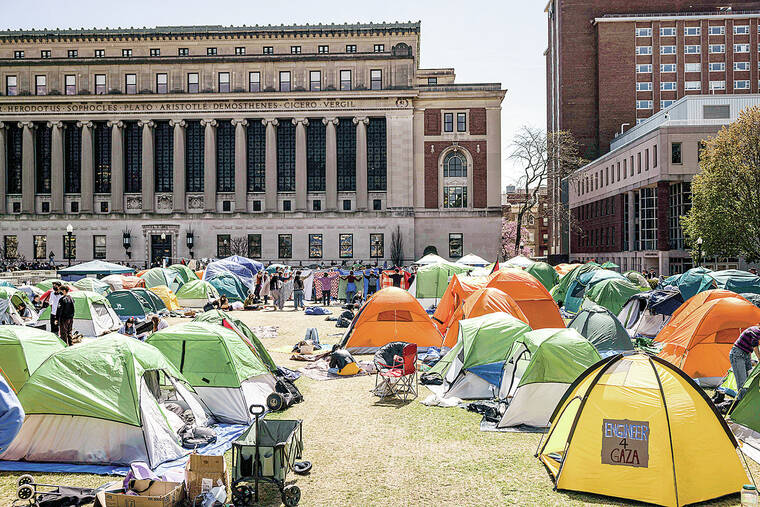Columbia protesters say they’re at an impasse with administrators and will continue anti-war camp
NEW YORK — Columbia University students who inspired pro-Palestinian demonstrations across the country said Friday that they reached an impasse with administrators and intend to continue their encampment until their demands are met.
The announcement after two days of exhaustive negotiations came as Columbia’s president faced harsh criticism from faculty. Professors and staff at several other universities across the country have similarly condemned leadership over the use of police against demonstrators, which has led to fierce clashes, injuries and hundreds of arrests. The tensions add pressure school officials from California to Massachusetts who are scrambling to resolve the protests as May graduation ceremonies near.
As the death toll mounts in the war in Gaza and the humanitarian crisis worsens, protesters at universities across the country are demanding that schools cut financial ties to Israel and divest from companies they say are enabling the conflict. Some Jewish students say the protests have veered into antisemitism and made them afraid to set foot on campus.
Student negotiators representing the Columbia encampment said that after meetings Thursday and Friday, the university had not met their primary demand for divestment, although there was progress on a push for more transparent financial disclosures.
“We will not rest until Columbia divests,” said Jonathan Ben-Menachem, a fourth-year doctoral student.
Columbia officials had said earlier that talks were showing progress.
“We have our demands; they have theirs,” university spokesperson Ben Chang said, adding that if the talks fail, Columbia will have to consider other options.
Meanwhile, Columbia’s president, Minouche Shafik, faced a significant — but largely symbolic — rebuke from faculty Friday but retained the support of trustees, who have the power to hire or fire the president.
A report by the university senate’s executive committee, which represents faculty, found Shafik and her administration took “many actions and decisions that have harmed Columbia University.” Those included calling in police and allowing students to be arrested without consulting faculty, failing to defend the institution in the face of external pressures, misrepresenting and suspending student protest groups and hiring private investigators.
“The faculty have completely lost confidence in President Shafik’s ability to lead this organization,” said Ege Yumusak, a philosophy lecturer who is part of a faculty team protecting the encampment.
Following the report, the senate passed a resolution that included a task force to monitor how the administration would make corrective changes going forward.
In response, Chang said in the evening that “we are committed to an ongoing dialogue and appreciate the Senate’s constructive engagement in finding a pathway forward.”
Also Friday, student protester Khymani James walked back comments made in an online video in January that recently received new attention. James said in the video that “Zionists don’t deserve to live” and people should be grateful James wasn’t killing them.
“What I said was wrong,” James said in a statement. “Every member of our community deserves to feel safe without qualification.”
James, who served as a spokesperson for the pro-Palestinian encampment as a member of Columbia University Apartheid Divest, was banned from campus Friday, according to a Columbia spokesperson.
Protest organizers said James’ comments didn’t reflect their values. They declined to describe James’ level of involvement with the demonstration.
Across the country, protesters at California State Polytechnic University, Humboldt, barricaded themselves inside a building for the fifth day Friday. The administration offered them a 5 p.m. deadline to leave and “not be immediately arrested.” That deadline passed. The university did not immediately respond to a question for an update or provide information on what they planned to do after. The campus has been closed for the remainder of the semester.


